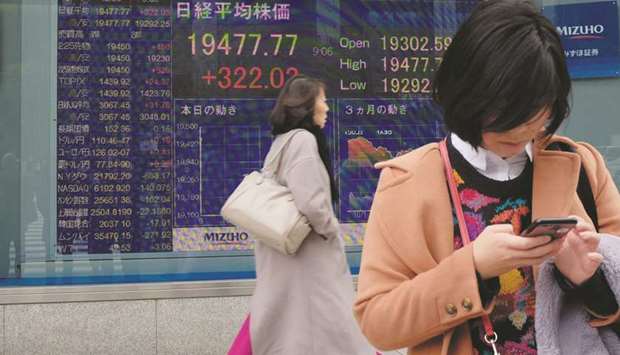Asian stock markets retreated again yesterday, extending a rout that began last week as US political uncertainty exacerbated worries over slowing global economic growth.
Investors were unnerved by the US federal government partial shutdown and President Donald Trump’s hostile stance towards the Federal Reserve chairman.
US Treasury Secretary Steven Mnuchin had also raised market concerns by convening a crisis group amid the pullback in stocks.
S&P 500 emini futures were last down 0.6%, pointing towards a lower start for Wall Street when the US market reopens after Christmas Day, when many of the world’s financial markets were shut.
Markets in Britain, Germany and France remained closed yesterday.
MSCI’s broadest index of Asia-Pacific shares outside Japan slipped 0.5%, brushing a two-month low.
The Shanghai Composite Index lost 0.4% while South Korea’s KOSPI shed 1.6%. Japan’s Nikkei, which slumped 5% the previous day, had a volatile session.
It swerved in and out of the red, falling more than 1% to a 20-month-low at one stage, before ending the day with a gain of 0.9%.
“In addition to concerns towards the US economy, the markets are now having to grapple with growing turmoil in the White House which has raised political risk ahead of the year-end,” said Masahiro Ichikawa, senior strategist at Sumitomo Mitsui Asset Management.
US stocks have dropped sharply in recent weeks on concerns over weaker economic growth.
Trump has largely laid the blame for economic headwinds on the Fed, openly criticising its chairman, Jerome Powell, whom he appointed.
That has further rattled investors as they grappled with fears of slowing global growth, corporate earnings and US-China trade tensions.
In an effort to reassure investors, Treasury Secretary Mnuchin spoke on Sunday with the heads of the six largest US banks, who confirmed they have enough liquidity to continue lending and that “the markets continue to function properly.”
“In the end, we believe that the Fed is the only presence capable of ending the current confusion in the markets,” Kenta Inoue, senior market economist at Mitsubishi UFJ Morgan Stanley Securities, said in a note.
“The White House will probably keep making gestures intended to halt the rout in stocks, but the federal government is likely to remain shut into the new year.
The US-China trade war also shows no signs of a resolution.”
US bond yields have declined amid the rout, including a steep sell-off in oil, prompted investors to move into safe-haven government debt, adding to the growing pressure on the dollar.
The dollar traded at 110.35 yen after retreating to a four-month low of 110.00 overnight against its Japanese peer, which tends to attract demand as a perceived safe-haven during times of market volatility and economic stress.
The euro was 0.15% higher at $1.1412.
The 10-year US Treasury note yield extended its fall to touch 2.722%, its lowest since early April.
In commodities, US crude futures were up 0.4% at $42.70 per barrel after tumbling 6.7% on Monday.
US crude futures plunged to the lowest level since June 2017 on Monday, as bearish stocks added to fears of an economic slowdown.
Brent crude futures were down 0.18% at $50.38 a barrel, having skidded 6.2% in the previous session to their weakest since August 2017.
Safe-haven gold was well bid, with spot prices brushing a six-month peak of $1,272.83 per ounce.

Pedestrians walk past a stock indicator board showing the share prices of the Tokyo Stock Exchange. Tokyo index opened higher yesterday, rebounding from the previous day’s 5% drop as the yen’s rise took a breather.
